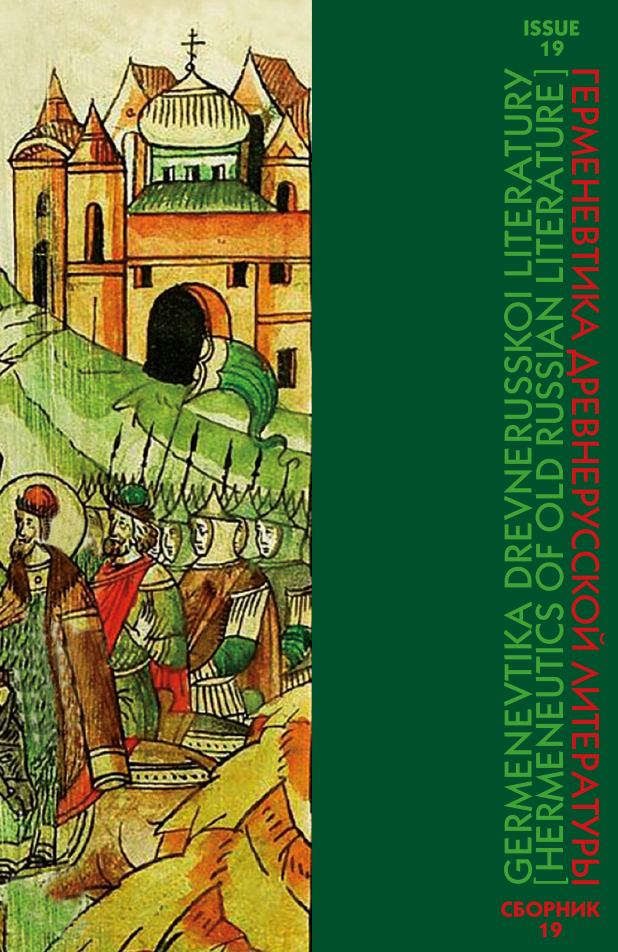Acknowledgements: The article was completed with the support of the program “Memory of the Past in Written Sources of the 16th–20th Centuries: Actualization of Events, Translation of Cultural Traditions, Research Practices” (FWZM-2021-0005).
Abstract:
The creative laboratory of Maximus the Greek contains the evidence of transformation of a letter into a public epistle, which becomes one of the leading genres of the Russian publicist writings of the 16th century. The paper presents the results of a textological study of four letters to Gregory, the deacon of the Bishop of Tver Achatius. The history of the text proved to be largely connected with the literary tradition of the collections of writings by Maximus the Greek of the late 16 – early 17 centuries, among which the Nizhny Novgorod-Paris collection is of special interest. A solution of the issue of attribution of The Tale of Crist’s Birth is proposed. The focus of the correspondence between Gregory and Maximus the Greek is on the issues of a linguistic and exegetic nature, which interested the curious deacon and his associates. At Gregory’s request, the Wise Man from Mount of Athos interprets certain variants of the Article of Faith, the second verse of Psalm 89 and discusses one of the dogmatic provisions related in the life of the Byzantine saint Blessed Andrew, the nature of the Trinity. Maximus the Greek wrote an exclusively personal letter to Gregory lamenting his inebriety, relating “his spiritual heartache” caused by his friend’s sin. The letter discloses the trusting relation between the Learned Monk and the deacon and becomes an important ego-source for comprehending the inner emotional world of the author. The poetics of the friends’ correspondence witness reduction of the etiquette norms of the epistolary genre, preservation of the didactic role of quoting sacred texts and special expression of the author’s self-knowledge and personality. The author’s writing attitude is aimed at achieving a perlocutionary effect.
REFERENCES
1 Bakhtin, M.M. “Problema rechevykh zhanrov” [“Issue of Speech Genres”]. Bakhtin M.M. Sobranie sochinenii [Collected Works by M.M. Bakhtin], vol. 5. Moscow, Russkii slovar’ Publ., 1996, pp. 159–286. (In Russian)
2 Bulanin, D.M. “Drevnerusskaia psaltirnaia ekzegeza kak indikator perekhodnykh epokh v istorii kul’tury” [“Old Russian Psaltery Exegesis as an Indicator of Transitional Epochs in the Culture History”]. Tezisy 50-i Mezhdunarodnoi nauchnoi filologicheskoi konferentsii imeni Liudmily Alekseevny Verbitskoi: 15–23 marta 2022 goda, Sankt-Peterburg [Proceedings of the 50th International Scientific Philological Conference Named after Ludmila Alekseevna Verbitskaya: March 15–23, 2022, St. Petersburg]. St. Petersburg, Saint Petersburg State University Publ., 2022. 140 p. (In Russian)
3 Bulanin, D.M. Perevody i poslaniia Maksima Greka. Neizdannye teksty [Translations and Epistles by Maximus the Greek. Unpublished texts]. Leningrad, Nauka Publ., 1984. 278 p. (In Russian)
4 Verner, I.V. “Interlinearnaia slaviano-grecheskaia Psaltyr’ 1552 g. v perevode Maksima Greka. Filologicheskoe issledovanie” [“Interlinear Slavonic-Greek Book of Psalms of 1552 in the Translation of Maximus the Greek. A Philologic Study”]. Interlinearnaia slaviano-grecheskaia Psaltyr’ 1552 g.: v perevode Maksima Greka [Interlinear Slavonic-Greek Book of Psalms of 1552 in the Translation of Maximus the Greek], study and prep. of text for publ. I.V. Verner. Moscow, Indrik Publ., 2019, pp. 9–154. (In Russian)
5 Zhivov, V.M., and B.A. Uspenskii. “Grammatica sub specie theologae. Preteritnye formy glagola ‘byti’ v russkom iazykovom soznanii XVI–XVIII vv.” [“Grammatica sub Specie Theologae. Preterit Forms of the Verb ‘to be’ in the Russian Language Conscience of the 16th–18th Centuries”]. Russian Linguistics, vol. 10, no. 3, 1986, pp. 259–279. (In Russian)
6 Zhurova, L.I. Avtorskii tekst Maksima Greka: rukopisnaia i literaturnaia istorii: v 2 ch. [Author’s Texts by Maximus the Greek: the Tradition of Manuscripts and Literature: in 2 parts], part 1. Novosibirsk, Izdatelstvo SB RAS Publ., 2008. 494 p. (In Russian)
7 Zhurova, L.I. “K voprosu ob istorii teksta Nizhegorodsko-Parizhskogo sobraniia sochinenii Maksima Greka (Paris, Man. Slave 123)” [“On the History of the Text of Nizhny Novgorod-Paris Collected Works of Maximus the Greek (Paris, Man. Slave 123)”]. Studi Slavistici. XVI, no. 2, 2019, pp. 241–260. (In Italian)
8 Zajc, N.Z. “U istokov monasheskogo mirovozzreniia prep. Maksima Greka (k 550-letiiu so dnia rozhdeniia sviatogo)” [“On the Origins of the Monastic Worldview of St Maximus the Greek (On the 550th Anniversary of His Birth)”]. Germenevtika drevnerusskoi literatury [Hermeneutics of Old Russian Literature]. Issue 20. Ed.-in-chief O.A. Tufanova. Moscow, IWL RAS Publ., 2021, pp. 250–272. (In Russian) https://doi.org/10.22455/HORL.1607-6192-2021-20-250-272
9 Markov, A.V. “Grammatika i vlast’. O renessansnom kontekste deiatel’nosti Maksima Greka” [“Grammar and Power. On the Renaissance Context of the Activities of Maximus the Greek”]. Voprosy literatury, no. 5, 2010, pp. 132–148. (In Russian)
10 Romodanovskaia V.A. “‘Sede odesnuiu Ottsa’ ili ‘sidel esi’? K voprosu o grammaticheskoi pravke Maksima Greka” [“‘He Was Sitting to the Right of Father’ or ‘He was sitting there’? On Grammatical Corrections of Maximus the Greek”]. Problemy istorii, russkoi knizhnosti, kul’tury i obshchestvennogo soznaniia. [Issues of History, Russian Booklore, Culture, and Public Conscience]. Novosibirsk, Sibirskii khronograf Publ., 2000, pp. 232–238. (In Russian)
11 Sinitsyna, N.V. “Tvorchestvo prepodobnogo Maksima Greka 30–50-kh gg. XVI v. i sobranie izbrannykh sochinenii iz 47 glav” [“Writings of Venerable Maximus the Greek in the 30–50s of the 16th Century and Selected Writings in 47 Chapters”]. Prepodobnyi Maksim Grek. Sochineniia [Venerable Maxim Grek. Works], vol. 2. Moscow, Rukopisnii pamiatniki Drevnei Rusi Publ., 2014, pp. 12–45. (In Russian)
12 Todd, U.M. Druzheskoe pis’mo kak literaturnyi zhanr v pushkinskuiu epokhu [A Friendly Letter as a Literary Genre in the Epoch of Pushkin]. St. Petersburg, Akademicheskii proekt Publ., 1994. 207 p. (series “Modern Western Russian Studies”). (In Russian)
13 Shashkov, A.T. “Tagil’skii sbornik sochinenii Maksima Greka (kodikologicheskie zametki)” [“Tagil Collection of Works by Maximus the Greek (Codicological Notes)”]. Rukopisnaia traditsiia XVI–XIX vv. na vostoke Rossii [Manuscript Tradition of the 16th–19th Centuries in the East of Russia]. Novosibirsk, Nauka Publ., 1983, pp. 4–14. (In Russian)






